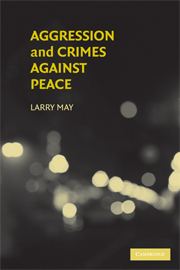Book contents
- Frontmatter
- Contents
- Acknowledgments
- PART A PACIFISM AND JUST WARS
- 1 Introduction: Between the Horrors and Necessity of War
- 2 Grotius and Contingent Pacifism
- 3 International Solidarity and the Duty to Aid
- PART B RETHINKING THE NORMATIVE AD BELLUM PRINCIPLES
- PART C THE PRECEDENT OF NUREMBERG
- PART D CONCEPTUALIZING THE CRIME OF AGGRESSION
- PART E HARD CASES AND CONCLUDING THOUGHTS
- Bibliography
- Index
1 - Introduction: Between the Horrors and Necessity of War
Published online by Cambridge University Press: 13 November 2009
- Frontmatter
- Contents
- Acknowledgments
- PART A PACIFISM AND JUST WARS
- 1 Introduction: Between the Horrors and Necessity of War
- 2 Grotius and Contingent Pacifism
- 3 International Solidarity and the Duty to Aid
- PART B RETHINKING THE NORMATIVE AD BELLUM PRINCIPLES
- PART C THE PRECEDENT OF NUREMBERG
- PART D CONCEPTUALIZING THE CRIME OF AGGRESSION
- PART E HARD CASES AND CONCLUDING THOUGHTS
- Bibliography
- Index
Summary
This book is about the normative grounding of crimes of aggression, or what are sometimes called crimes against peace. The crime of aggression is the only one of the three crimes charged at Nuremberg (the other two being crimes against humanity and war crimes) that is not currently being prosecuted. The ensuing discussion of the crime of aggression is timely since the International Criminal Court (ICC) has jurisdiction to prosecute such crimes, as they were prosecuted at Nuremberg, but the ICC currently lacks, and is now seeking, a mechanism for international trials for the crime of aggression. I will examine the justifiability of initiating war, as well as who should be held liable for initiating or waging an unjustified war. I will focus on issues in international criminal law, that is, on when and whether individuals should be prosecuted for initiating and waging aggressive war, rather than on the more traditional question of when or whether States are to be criticized or sanctioned for waging aggressive war.
My view is that crimes of aggression are deserving of international prosecution when one State undermines the ability of another State to protect human rights. This thesis runs against the grain of how aggression has been traditionally understood in international law. Previously, it was common to say that aggression involved a State's first strike against another State, where often what that meant was simply that one sovereign State had crossed the borders of another sovereign State.
- Type
- Chapter
- Information
- Aggression and Crimes Against Peace , pp. 3 - 24Publisher: Cambridge University PressPrint publication year: 2008



